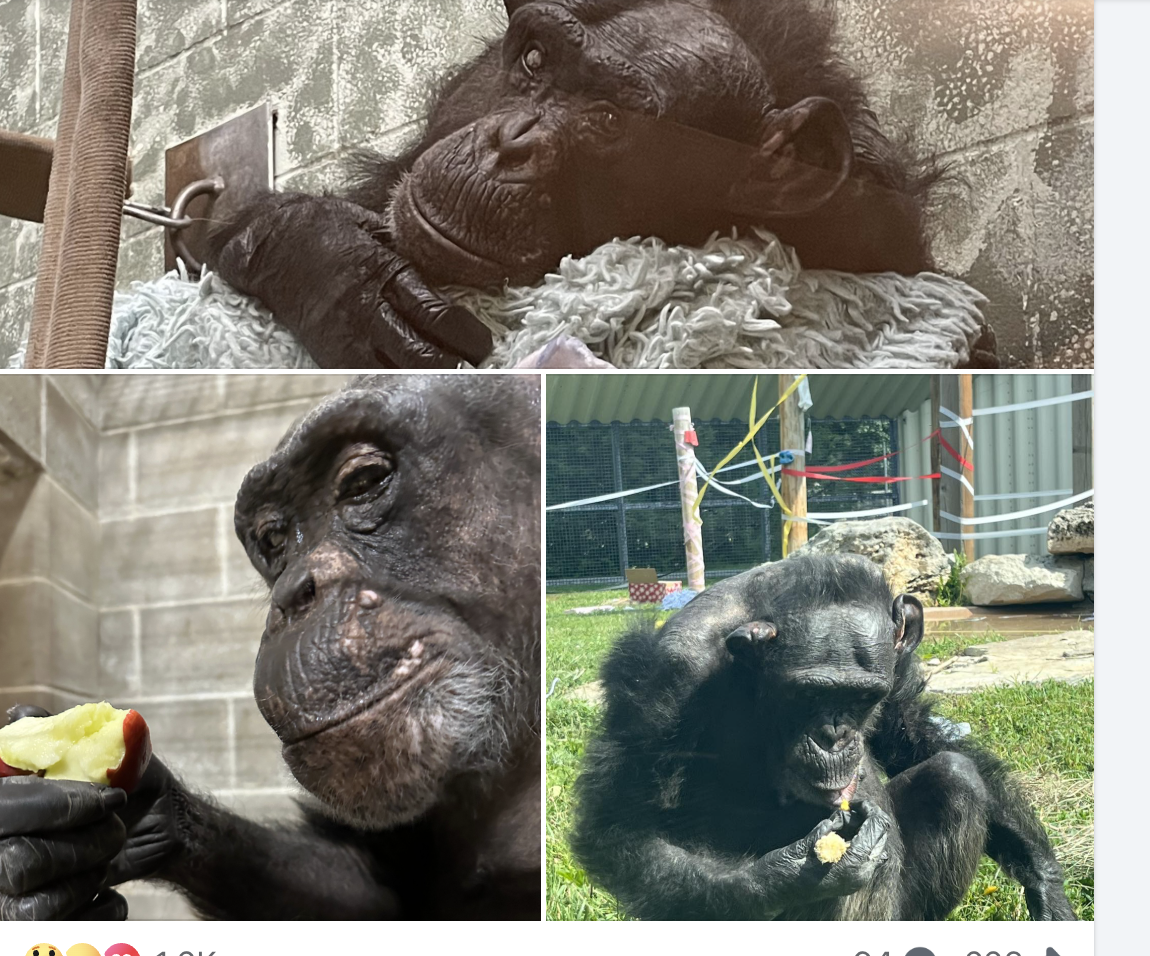
Sunset Zoo in Manhattan announced on Wednesday the passing of Susie the Western chimpanzee.S usie had been under close veterinary and caretaker observation to monitor for expected age-related health challenges such as development of cataracts, arthritis, and muscle loss for many years.
Through daily quality of life assessments which provide an objective understanding of animal wellbeing, staff recently noticed a significant decline in Susie’s behavior, mobility, and comfort level. Veterinary and animal care teams recognized that they could not provide any more medical and palliative care than was already administered. After careful evaluation and thoughtful discussion with chimpanzee experts, care staff, and Zoo management, the team made the compassionate yet difficult choice to humanely euthanize Susie.
At 71, Susie had the proud distinction of being the oldest female chimpanzee in human care. Susie lived more than three decades beyond the average chimpanzee lifespan in the wild, which is typically around 40 years. Her life is a testament to the dedication of Sunset Zoo’s animal care team and partners at Kansas State University’s College of Veterinary Medicine.“Susie was a truly special animal here at Sunset Zoo,” reflected Sunset Zoo Director, Scott Shoemaker. “She touched the hearts of every member of our team. Whether she was giving ‘kisses’ to those she knew or enjoying one of her favorite treats—popcorn—she always brought joy to our days. She will be deeply missed.”
Susie was born in 1954 and arrived at Sunset Zoo in 1974. Like other members of the community, she witnessed many changes to the Zoo and the chimpanzee habitat specifically. When Susie first arrived at Sunset Zoo, she lived in a habitat near where the otters are currently located. She moved to the then-primate building which has since been removed from public view and houses the keeper offices. In 1997, the Chimpanzees of Tanganyika habitat opened, which became her permanent home.“Like so many in Manhattan, I grew up visiting Susie,” remembered Parks and Recreation Director, Aaron Stewart. “She was part of my childhood and has been part of this community’s story for generations. Her long life is something we should truly celebrate—a reflection of the remarkable care she received and the deep compassion of those who watched over her every day.
But her passing is also deeply felt. For countless families, Susie was their first connection to wildlife, their first visit to Sunset Zoo, and their first lesson in empathy for animals. Her presence brought joy, wonder, and a sense of shared pride that will live on in the memories of our community and everyone who had the privilege to know her.”Susie is survived by her troop members Julian (46), Hazina (38), Hususa (33), and Koto (12). Over her lifetime, Susie gave birth to seven offspring and held the distinction of being the oldest chimpanzee in human care to give birth. She is survived by two of her daughters: Sesa, born in 1988 and now residing at Montgomery Zoo, and Siri, born in 2010—when Susie was 56 years old—who lives at Albuquerque BioPark Zoo.
“Susie’s legacy will extend far beyond her years here at Sunset Zoo,” remarked Sunset Zoo Curator of Education, Erica Buckwalter. “Not only did she play a vital role in helping secure a future for chimpanzees in managed care, but she also inspired generations of guests to care for and protect wildlife and wild places. We can honor her legacy by being good stewards of the natural world she helped us appreciate.”Sunset Zoo appreciates the compassion and concern of guests and asks for their understanding as the team mourns the loss of this beloved member of the Zoo family.
Guests wishing to share their memories of Susie may sign the cards located in the Ballard Gallery primate viewing area.Chimpanzees are currently listed as Endangered in the wild, with populations continuing to decline due to habitat destruction, illegal wildlife trade, and poaching. It is estimated that only around 150,000 to 250,000 individuals remain across Africa. Conservation efforts are critical to protect remaining wild populations, support sustainable habitats, and prevent further decline of this intelligent and social species.





